A LAGNIAPPE ROUNDTABLE DISCUSSION
The U.S. Stock market has recovered from the freefall of 2009; but while things have improved, there’s still more than enough uncertainty to keep investors reaching for the Tums on a regular basis.
DR. KURTH: There is a lot of uncertainty in the investment world today. We’ve had a strong bull market for six years, during which the S&P 500 has risen over 200 percent. Some are wondering how long such gains can continue. Meanwhile, the world is awash in debt, oil prices have plunged, the value of the dollar is rising, and sabers are rattling. Are investors becoming more concerned about preserving their recent gains than increasing their wealth by seeking higher rate of return on riskier investments? In other words, are investors becoming more risk averse?
JONES: To some extent they are; but investors always want higher returns. The problem is that it’s getting harder to find good returns without taking unacceptable risk. But I worry more about what’s going on outside the U.S.; what’s happening in Europe, and in Greece. One of the strangest things I’ve seen in my career is interest rates in Europe right now; you buy a three-year, $10,000 government bond in Germany, and in two years you get back $9,800 … a negative return. I’m wondering if that’s going to come across the Atlantic at some point.
KURTH: Since bonds pay next to nothing, are people buying them strictly to avoid risk?
ROSE: People who live on the interest from their CDs aren’t getting much right now, and it may get worse. The current risk-to-reward ratio is the strangest thing I’ve ever seen. There is no way the reward right now justifies the risk. If interest rates go up, stock prices go down, and a correction in the stock market would pale in comparison to what could happen in the bond market. I haven’t bought bonds in years.
KURTH: You guys were once known as “stockbrokers,” and if someone wanted to invest in the stock market, they had to go to a stockbroker to buy their stocks. But today, with the Internet and online trading, anyone with a computer can buy stocks. Now you are called “financial advisors,” or “wealth advisors.” What do you do for your clients that they can’t do for themselves?
JONES: At Wells Fargo, we offer a wide range of services, from helping people select individual investments to developing a retirement plan. I have access to many resources, such as research analysts, and economic and market experts, to help people make informed investment decisions based on a client’s specific needs
ROSE: Little of what we do is transactional anymore. Today we focus on asset allocation, advising and managing expectations. It’s a relationship; sometimes you are holding their hands, and sometimes you are cheerleading. Our best clients are the ones who want our advice, and take our advice. With all the uncertainty in the world, our services are more valuable now than ever.
JONES: Investors are like the cavalry; they are a lot more comfortable going in the same direction as everyone else. The bottom of the bear market is a point when many people want out, and it’s our job to keep them in, and it’s also our job, when the market is up, not to let them get over-enthusiastic and throw caution to the wind. That’s not easy.
AGUILLARD: The term that comes to my mind is “robo-advisor.” The industry is changing, but clients generally want someone to advise them in the most important events in their lives. Retirees, for example, are handing over a lifetime of accumulated wealth, and asking you to turn it into an income stream they will have to live off for the rest of their lives. It’s hard to entrust that to a computer program.
KURTH: A lot of investors remember the roller coaster rides they took with the dot.com boom and bust, and the housing market boom and bust. The current market doesn’t feel like a bubble to me, but there are things that concern me. How long can this bull market continue and do I think it is a bubble that could suddenly burst?
JONES: I don’t view it as a bubble.
ROSE: Stocks are not nearly as cheap as they were in 2009, obviously, but the market is not as skewered as it was in 2000 when things were just crazy.
AGUILLARD: Stocks have always been risky; that’s why they pay more than bonds. But they are not cheap today. If you have excess or discretionary funds allocated to stocks in your portfolio, now might be a good time to shave some of that risk.
KURTH: My biggest concern with the stock market is what happens when interest rates go up. The relationship between bond prices and stock prices is pretty much mathematical; when interest rates go up, stock prices are going to come down. And you’re saying it’s almost inevitable that at some point, interest rates are going to go up.
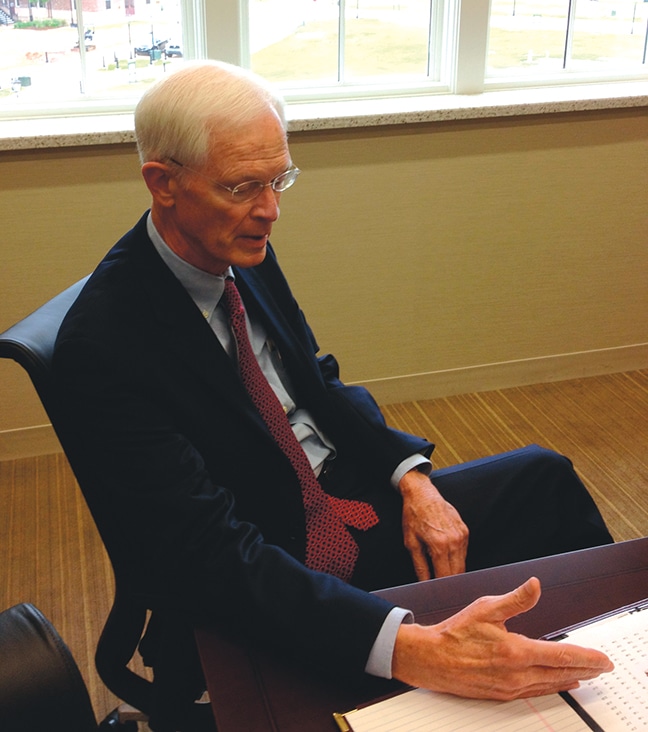
Bob Jones: financial advisor with Wells Fargo Advisors. Jones served in the Louisiana House of Representatives from 1968 to 1972 and the State Senate from 1972 to 1976. He is the son of the late Gov. Sam H. Jones
JONES: The question is when. I’ve been waiting for them to go up for two or three years now. But with the dollar/euro imbalance, the Fed will be pretty slow to raise the interest rate because it will mean the dollar will get that much stronger.
KURTH: I think that as long as we have a relatively weak economic recovery, and poor labor market, the Fed is likely to keep interest rates low, to stimulate the economy. But once the economy starts to pick up steam, the Fed is likely to raise interest rates and that’s when stock prices will fall.
AGUILLARD: I don’t think the bull market has been driven by low interest rates. Stock prices primarily reflect earnings, and there has been strong earnings growth over the past five or six years. When you look at the price/earnings ratio of stocks today, it’s not far from normal.
ROSE: I don’t see higher interest rates as a particular risk to the stock market. I worry about higher interest rates being a shock to people who may suddenly see the value of their bonds plunge overnight. There’s as much risk, maybe more, in fixed income, which is counter-intuitive. Usually stocks are riskier than bonds.
JONES: You make a good point, because there are a lot of blue chips stocks paying three or four percent. And there is nothing wrong with holding cash, either. You have to be well-diversified; a lot more now than in the past.
AGUILLARD: If I’m a fixed-rate investor, and I believe rising interest rates are going to dramatically impact my fixed income portfolio — and I’m not saying that it will — I want to do one of two things: either take something further down the credit quality ladder to get a higher return, or go into the equity market, which, obviously, delivers a better risk-adjusted rate of return over time. But to assume any retiree can ignore the fixed market is not realistic. Most people will end up either embracing more equity risk, or holding cash, which pays zero interest.
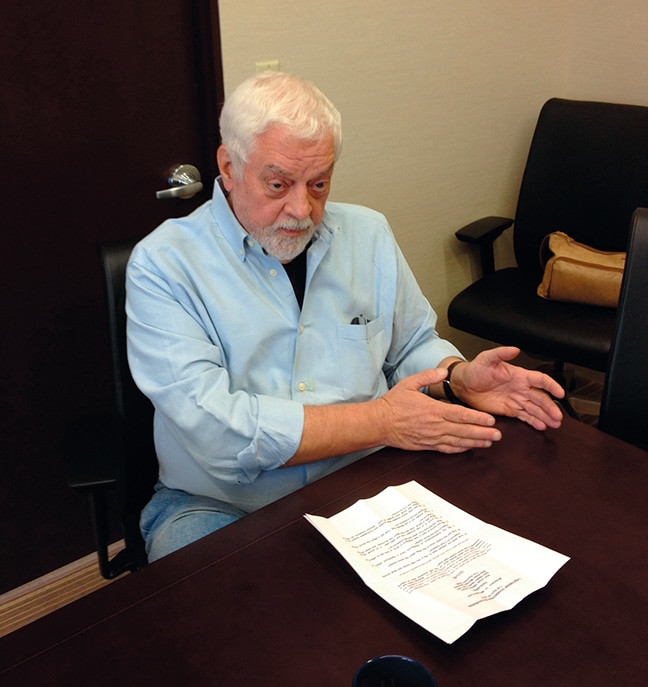
Former McNeese economics professor and Lagniappe columnist Dr. Michael Kurth (second from left) recently sat down with three of the area’s most experienced investment professionals, or wealth advisors, to talk about the areas of concern in today’s market, what the future might hold, and the importance of seeking out professional advice when considering investing.
KURTH: Twenty years ago, people looked to the stock market as an indicator of the health of the U.S. economy. But that’s not true anymore, is it? Over half of the Dow Jones earnings come from outside the U.S.
JONES: No, it’s not that clear-cut anymore.
KURTH: Bob, you’ve touted global investments over the years. What do you think about opportunities in emerging markets?
JONES: I think investors should have a certain percentage of their money there, because that is where analysts are projecting the greatest growth will be, but along with more potential comes more risk.
ROSE: International investors always face added risk; it’s just not always in the same countries or regions of the world. But, yes, there are some great opportunities abroad. We believe in having a percentage of our clients’ portfolios invested abroad. It’s hard to be country-specific or stock-specific — that’s why you want to rely on a professional investor — the best you can find.
KURTH: So investors shouldn’t lay awake at night worrying about how events in the Middle East, China or Ukraine are going to affect their portfolios?
ROSE: I think there’s less of a risk in that than having all of their income invested in U.S. stocks. If you’re looking for opportunity, it exists abroad.
AGUILLARD: The stock market responds quickly to crises. Warren Buffett said it best when he said that in the short term the market is like a voting machine reflecting peoples’ attitudes, but in the long term it’s like a weighing machine, a scale … and it will correct itself and get it right.
KURTH: So by diversifying and including foreign stocks in your portfolio, especially in emerging markets, one can reduce the risk from the U.S. economy?
ROSE: The $64,000 question is how much and where. And you don’t want to focus just on developing countries. You want to look at developed countries, too.
AGUILLARD: Since 1975, emerging markets have provided a rate of return that equals or surpasses that of the U.S. If you ignore international markets, both emerging and developed, you could leave a lot of return on the table. Allocation to international markets should be a constant in everyone’s portfolio.
KURTH: If someone wants to diversify their portfolio with foreign investments, should they focus on a particular country, or try to spread their global investments around?
JONES: By investing in one country, you assume a currency risk.
KURTH: Are you referring to U.S. currency risk, or foreign currency risk? If you invest in a global company with operations in several different countries, you’re not really at risk from a particular foreign currency, but you are at risk from the U.S. dollar increasing in value and cutting into your profit.
ROSE: There’s always something on the horizon to worry about; if you watch too much TV news, you’d never invest. So much of what we do as advisors is managing emotion, and trying to help investors see the bigger picture. ISIS is a terrible threat today, but 10 years ago there was another threat that would have kept you from investing, and there will be a different threat 10 years from now. Hopefully, we can help investors cope with those fears, because with great risk comes great opportunity.
KURTH: What about falling oil prices? Is that situation creating uncertainty in investors?
ROSE: I was shocked to how quickly oil and gas prices compressed. Lower oil prices might not be good for Louisiana and Texas, but, for most of the country, it has been a de facto tax cut, with huge savings for companies, which is reflected in their earnings. It’s also amazing that the U.S. has become such a large producer, with hydro fracking and other directional drilling methods. I think there’s opportunity in the long term as oil and gas prices drift higher again.
KURTH: When you say gas, you’re talking about natural gas, not gasoline at the pump.
ROSE: Yes, natural gas.
KURTH: I’ve heard it said that you should invest in companies you are familiar with, such as local companies. There’s a lot of activity in Southwest Louisiana right now. Are there opportunities locally investors should be looking at?
JONES: The idea is to buy things you know and understand. And, yes, I think you can look at the local economy to add to your portfolio.
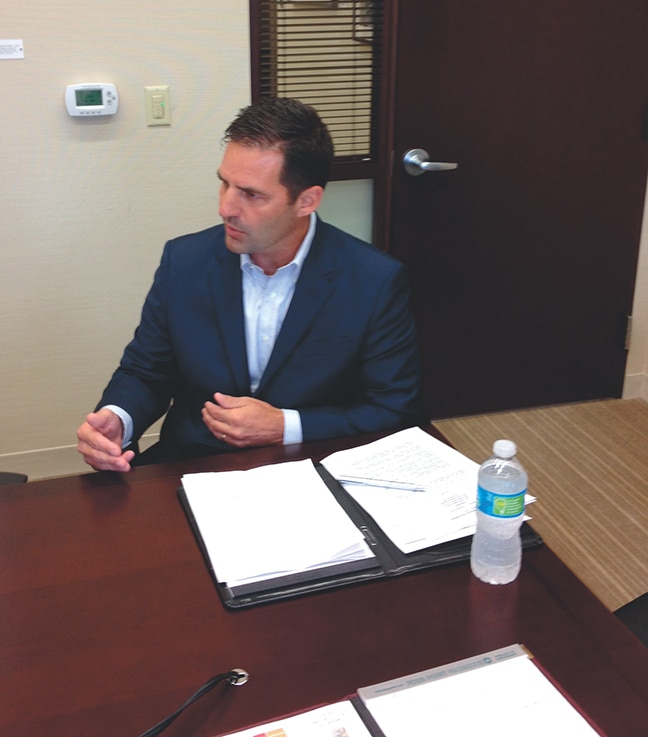
Tim Aguillard: Certified Financial Planner and a Certified Public Accountant. He is the director of Integrated Financial Management
AGUILLARD: My concern with that is that we represent a tiny portion of the investment picture. If investors restrict their options to oil and gas — refineries and the like — they come up with a portfolio that’s not very well diversified.
KURTH: It doesn’t have to be buying into an established company. It could be real estate or a start-up company.
AGUILLARD: I think that kind of diversification is wonderful. In the real estate area, though you have tax issues you need to be aware of — most of those deal with self-dealing and the ultimate use of the property. It requires planning.
JONES: For diversification, I lean toward income-producing investments, because if the market goes down, you need that cushion to fall back on. The recent announcement by Apple that they’re paying some of their profit to their stockholders is an indication that companies are becoming aware that they need to provide returns, not just growth, for their shareholders.
KURTH: Let’s go back to what Bob was saying about the national debt, and a possible financial crisis. That’s something I’ve been concerned about for a long time.
JONES: Right now, no one seems to be very concerned about it, but I think it could be a major problem in the future.
AGUILLARD: I think that’s where a large portion of investment risk resides. It’s a potential liquidity trap: If too much of the debt hits the door at the same time, who will be on the other end of that transaction? You can mature debt, you can turn it out, but if there’s a liquidity dash, then that’s a problem.
JONES: That’s what was happening in 2008 and 2009.
ROSE: Lehman Brothers failing, no bids for bonds, and we saw what happened to asset prices. Quickly. Hopefully, that’s not something we’ll see again in our careers.
JONES: There is nothing wrong with sitting on the sidelines and holding cash; cash is safer than bonds right now, and you aren’t giving up much interest.
KURTH: And gold?
JONES: Sure, why not?
KURTH: So, to sum things up, you guys think the stock market may be a bit over-priced and due a correction, but it is not a bubble that is going to suddenly burst. And you all say having some global investments in your portfolio is a good way to increase your returns. If someone is concerned about a stock market correction, you say they should not head to bonds for safety, because the yield on bonds is too low, and when interest rates go up, which must eventually happen, the value of bonds will fall. It would be safer to hold cash right now than to buy bonds. And, of course, if they are concerned about preserving and growing their wealth, they should seek advice from a qualified investment advisor. Is there anything else you would like to add?
ROSE: I would just like to say that we are lucky to work in a rewarding industry where we get to help our clients set goals and hopefully achieve them. I enjoy what I do now more than ever and hope I can continue to this for years to come.



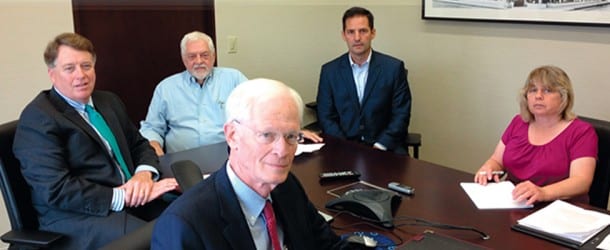
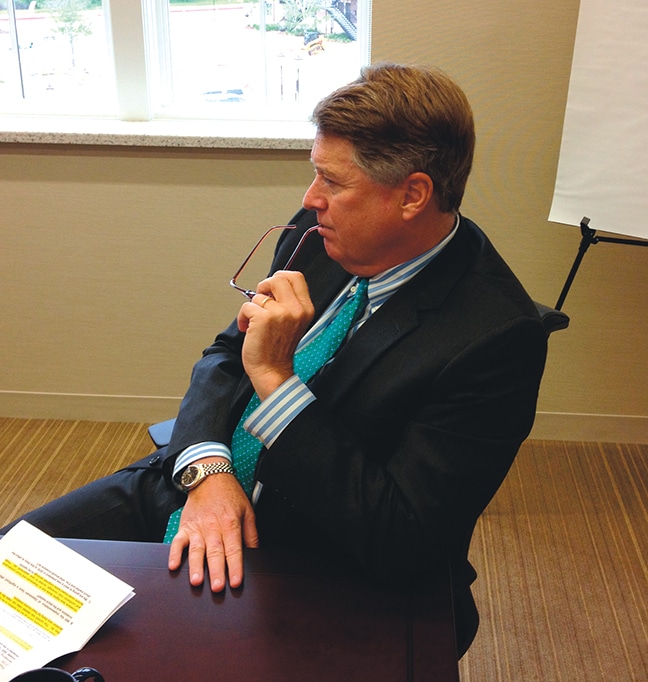













Comments are closed.